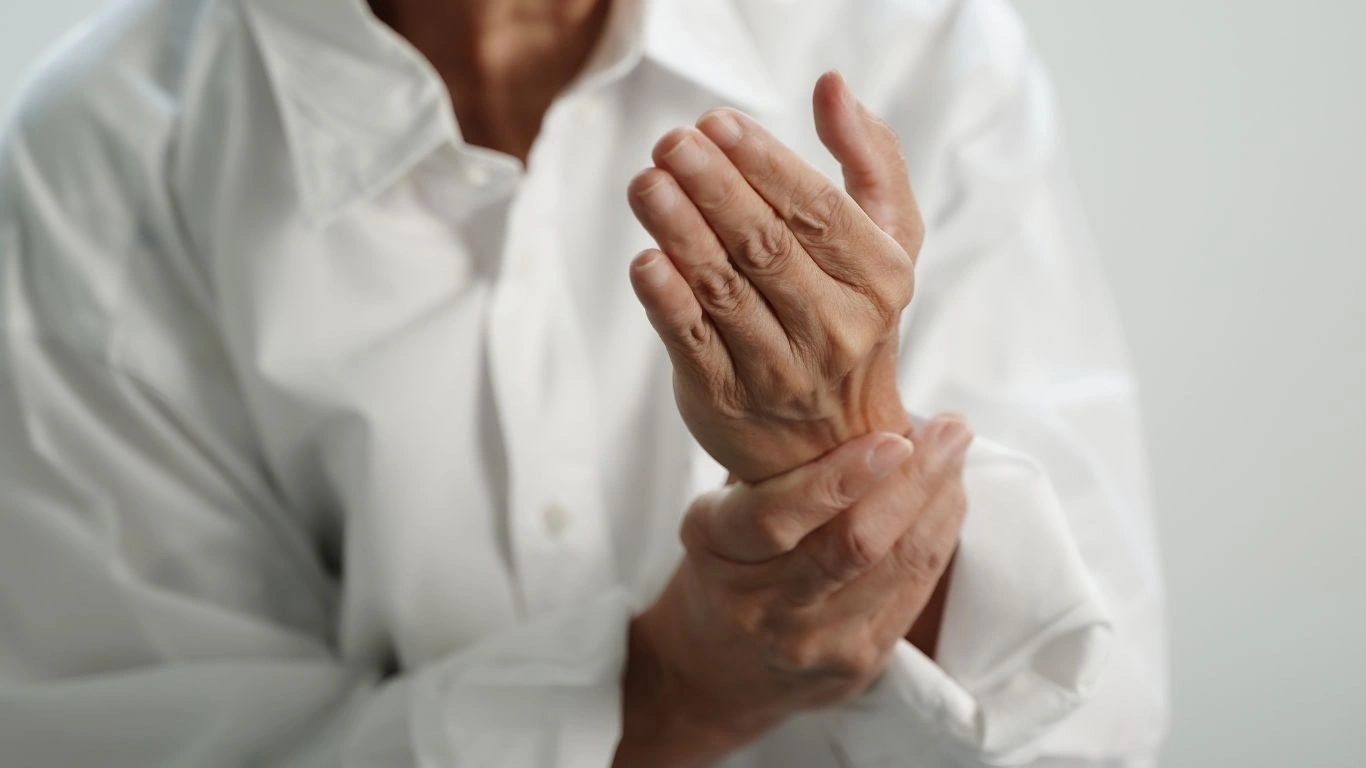Transform Your Life with Rheumatoid Arthritis: Lifestyle Changes for Better Health
Living with rheumatoid arthritis (RA) can feel like a constant battle—physically, mentally, and emotionally. As someone who’s worked as a Rheumatology Nurse Practitioner, I’ve seen firsthand how it affects people’s daily lives. But one thing I’ve learned is that managing RA isn’t just about medications and doctor’s visits. Lifestyle changes can play a huge role in improving quality of life and overall health. In fact, by adjusting certain habits, you can make significant strides toward better managing your condition. So let’s dive into how lifestyle changes can help you live better with rheumatoid arthritis!
Understanding Rheumatoid Arthritis and Its Impact on Daily Life

Rheumatoid arthritis is more than just joint pain. It’s an autoimmune disease that causes inflammation in the lining of your joints, leading to pain, stiffness, and sometimes even deformities. Unlike osteoarthritis, which typically results from wear and tear, RA is an autoimmune condition, meaning the body’s immune system mistakenly attacks its own tissues. Over time, this can damage the joints and surrounding tissues.
The impact on daily life can be significant. Simple tasks—like opening a jar, typing on a keyboard, or getting out of bed in the morning—can become a struggle. The unpredictability of flare-ups can make planning ahead difficult. This is why managing your lifestyle with RA is not just about alleviating symptoms—it’s about reclaiming control over your life.
Dietary Adjustments: Nourishing Your Body to Combat Inflammation

When it comes to lifestyle changes, diet is a key factor in managing rheumatoid arthritis. What you eat can either fuel inflammation or help reduce it. Anti-inflammatory foods are essential in keeping symptoms at bay. A diet rich in antioxidants, omega-3 fatty acids, and other anti-inflammatory nutrients can provide significant relief for many RA sufferers.
Anti-Inflammatory Foods You Should Consider
- Fatty Fish – Salmon, mackerel, and sardines are loaded with omega-3 fatty acids, which have been shown to reduce inflammation in the body.
- Leafy Greens – Vegetables like spinach, kale, and Swiss chard are high in vitamins and antioxidants, helping to combat oxidative stress.
- Turmeric – This bright yellow spice contains curcumin, a compound with strong anti-inflammatory properties that can help manage RA symptoms.
- Olive Oil – Extra virgin olive oil is rich in oleocanthal, which has been shown to have anti-inflammatory effects similar to non-steroidal anti-inflammatory drugs (NSAIDs).
- Fruits – Berries, cherries, and citrus fruits are packed with antioxidants that help reduce inflammation.
Foods to Avoid: Reducing Foods that Trigger Inflammation
While there are plenty of anti-inflammatory foods, there are also certain foods that can increase inflammation in the body. Here are some that people with rheumatoid arthritis should consider limiting or avoiding:
- Sugary Beverages – Soda and sugary juices can spike insulin levels and promote inflammation.
- Processed Foods – Junk foods like chips, fast food, and baked goods made with refined flour and unhealthy fats can trigger inflammatory responses.
- Red Meat – High-fat meats like steak and bacon can increase the body’s production of inflammatory compounds.
- Alcohol – While moderate alcohol consumption may have some health benefits, excessive drinking can exacerbate inflammation and even interact with RA medications.
Exercise: Moving Your Body to Stay Strong

Many people with RA shy away from exercise because of the pain and stiffness, but regular physical activity can actually be one of the best things you can do for your joints. Exercise helps improve flexibility, reduce stiffness, and strengthen the muscles surrounding the joints, which can alleviate some of the burden on them. Plus, staying active can help improve mood and reduce the feelings of fatigue that often accompany RA.
Best Types of Exercise for Rheumatoid Arthritis
When it comes to exercise, it’s important to choose activities that are gentle on your joints. Here are some options that are often recommended for people with RA:
- Water Aerobics – The buoyancy of water helps take the strain off your joints while allowing for a good workout.
- Walking – A simple walk, whether outside or on a treadmill, is a low-impact exercise that can help improve circulation and reduce stiffness.
- Yoga – Yoga can help improve flexibility, reduce stress, and promote relaxation, all of which can aid in managing RA symptoms.
- Stretching – Gentle stretching can help maintain joint mobility and reduce morning stiffness.
How Much Exercise Is Enough?
When it comes to exercise, consistency is key. Aim for at least 30 minutes of moderate activity most days of the week. But remember, listen to your body—if you’re experiencing a flare-up, it’s okay to scale back or opt for gentler forms of movement. The goal is to stay active without overexerting yourself.
Prioritizing Mental Health: The Emotional Side of Rheumatoid Arthritis

As if managing physical symptoms of rheumatoid arthritis isn’t challenging enough, the emotional toll can be just as significant. When you live with a chronic condition, it can feel like you’re constantly on edge, wondering when the next flare-up will hit. I’ve had many patients express feelings of frustration, sadness, and even guilt about not being able to do things they once enjoyed. Over time, this emotional strain can lead to anxiety, depression, and a decreased overall quality of life.
What many people don’t realize is that mental health and physical health are deeply connected. When you’re stressed or depressed, it can actually make RA symptoms worse—leading to more inflammation and pain. But, just as with physical changes, you can take steps to improve your mental well-being and find emotional relief. Managing stress, staying connected with others, and seeking professional support can make all the difference.
Stress Management Techniques for RA Patients
Chronic stress is known to trigger inflammation, which can worsen symptoms of rheumatoid arthritis. Here are some practical techniques I’ve recommended to patients to manage stress more effectively:
- Deep Breathing and Meditation – Simple breathing exercises can help lower stress hormones and calm your mind. Even just a few minutes of meditation can help improve focus and reduce anxiety.
- Mindfulness – Being mindful means staying present in the moment, rather than worrying about the future or dwelling on the past. This can significantly reduce stress and improve emotional resilience.
- Progressive Muscle Relaxation (PMR) – This technique involves tensing and then relaxing different muscle groups in your body to release physical tension and promote relaxation.
- Journaling – Writing about your feelings can help you process emotions, track triggers, and express frustrations in a healthy way.
Quality Sleep: How Sleep Affects Rheumatoid Arthritis

When it comes to rheumatoid arthritis, sleep is one of the most overlooked aspects of health. It’s easy to underestimate just how much your sleep quality can impact the severity of your symptoms. I’ve seen patients whose RA symptoms worsened simply because they weren’t getting enough restorative sleep. Unfortunately, the pain and discomfort from RA often make it hard to get a good night’s rest, creating a vicious cycle that can be tough to break.
However, sleep is essential for your body’s repair and recovery. During sleep, your body regenerates cells, reduces inflammation, and resets its immune system. If you’re not getting enough quality sleep, it can worsen joint pain, increase fatigue, and make it harder to cope with daily challenges. So, let’s explore some tips that can help improve your sleep while managing RA symptoms.
Tips for Better Sleep with Rheumatoid Arthritis
- Establish a Bedtime Routine – Consistency is key. Going to bed and waking up at the same time every day helps regulate your body’s internal clock, making it easier to fall asleep and stay asleep.
- Optimize Your Sleep Environment – Keep your bedroom cool, dark, and quiet. Consider using earplugs or a white noise machine if noise is an issue, and blackout curtains if light is disruptive.
- Gentle Stretches Before Bed – Performing light stretching before bed can ease joint stiffness and help relax your muscles, making it easier to fall asleep.
- Avoid Caffeine and Heavy Meals – Try to avoid caffeine in the late afternoon or evening, and avoid heavy meals right before bed. These can interfere with your ability to fall into a deep, restful sleep.
- Consider a Supportive Mattress and Pillow – A mattress that supports your body in a neutral position can help prevent further strain on your joints. Don’t underestimate the power of a good pillow to support your neck and spine.
Social Support: Building a Strong Network of Caregivers

One of the most important lifestyle changes you can make in managing rheumatoid arthritis is surrounding yourself with a strong support system. Living with RA can feel isolating at times, especially on days when your pain levels are high. But the truth is, you don’t have to go through it alone. Having a support network of family, friends, and healthcare professionals is essential for coping with the emotional and physical challenges of RA.
In my experience, I’ve seen how much difference it makes when someone has the support they need. Whether it’s a partner helping with daily tasks, a friend who checks in regularly, or a support group where you can connect with others facing similar challenges, these relationships can provide much-needed emotional relief and practical assistance.
How to Build a Supportive Network
- Family and Friends – Don’t hesitate to reach out to loved ones for help. Being open about your condition and needs can make them more understanding and willing to lend a hand when you need it.
- Support Groups – Online or in-person support groups can be a great way to connect with others who understand what you’re going through. These groups provide an opportunity to share experiences, get advice, and offer encouragement to one another.
- Healthcare Providers – Your rheumatologist and other healthcare professionals should be part of your support network. Don’t hesitate to lean on them for guidance in managing RA and improving your quality of life.
- Therapists and Counselors – It can also be helpful to talk to a therapist if you’re struggling emotionally. Cognitive behavioral therapy (CBT) is particularly effective in helping people with chronic conditions cope with stress and anxiety.
Remember, your journey with rheumatoid arthritis doesn’t have to be one of isolation. Building a network of support can help lighten the load and make you feel more empowered to face the challenges that RA throws your way.
Medication and Treatment: Balancing Medical Interventions with Lifestyle Changes

As much as lifestyle changes can make a difference in managing rheumatoid arthritis (RA), we can’t forget that medications and treatments play a central role in controlling the disease. There’s no one-size-fits-all approach, and the treatment plan should be as personalized as possible. As a Rheumatology Nurse Practitioner, I’ve seen the profound impact that the right combination of medications and lifestyle changes can have on a person’s RA journey.
While diet, exercise, stress management, and sleep are crucial for managing symptoms and improving overall health, medication is often necessary to reduce inflammation and prevent joint damage. The goal of treatment is to control symptoms, prevent flare-ups, and slow the progression of the disease. But remember, medication alone is usually not enough. It works best when combined with the positive changes you make to your daily habits.
Common Medications for Rheumatoid Arthritis
- DMARDs (Disease-Modifying Anti-Rheumatic Drugs) – These are the cornerstone of RA treatment and help slow down the disease’s progression. Methotrexate is one of the most commonly prescribed DMARDs.
- Biologic Agents – Biologics are a newer class of medications that target specific parts of the immune system that drive inflammation. TNF inhibitors like Enbrel and Humira are examples of biologics.
- NSAIDs (Non-Steroidal Anti-Inflammatory Drugs) – These help reduce pain and inflammation. Ibuprofen and naproxen are common NSAIDs used for symptom relief.
- Corticosteroids – These drugs, like prednisone, help control inflammation and can be very effective during flare-ups, but they come with a risk of side effects, so they are generally used for short-term relief.
It’s important to work closely with your healthcare provider to find the right balance of medication and lifestyle strategies that work for you. And don’t forget, the process can take time—sometimes it takes trial and error to find the right combination that effectively manages your symptoms.
Alternative Therapies: Exploring Complementary Options

While conventional treatments are essential for managing rheumatoid arthritis, many people seek complementary or alternative therapies to improve their quality of life. These therapies aren’t meant to replace medical treatments but can be used in conjunction to help manage symptoms and provide additional relief. If you’re considering adding alternative therapies to your treatment plan, it’s important to discuss them with your healthcare provider to ensure they’re safe and appropriate for your specific situation.
Popular Alternative Therapies for Rheumatoid Arthritis
- Acupuncture – Some studies suggest that acupuncture may help reduce pain and inflammation by stimulating certain points on the body. While the evidence is mixed, many people with RA report feeling relief after acupuncture sessions.
- Massage Therapy – Therapeutic massage can help relieve muscle tension, improve circulation, and reduce stress. Just be sure to communicate with your massage therapist about any sensitive or inflamed areas to avoid injury.
- Herbal Supplements – Certain herbs, like turmeric (curcumin), ginger, and boswellia, have anti-inflammatory properties that may help reduce symptoms. However, it’s important to approach supplements with caution and consult your doctor, as they can interact with medications.
- Chiropractic Care – Some RA patients find relief from joint pain through chiropractic adjustments. However, it’s essential to consult with your doctor before seeking chiropractic care, as improper adjustments could aggravate symptoms.
- Mind-Body Techniques – Practices like yoga, tai chi, and meditation can help reduce stress, improve flexibility, and promote relaxation, all of which can benefit individuals living with RA.
Alternative therapies are not a replacement for conventional treatment, but they can offer additional tools in your toolbox for managing RA and improving overall well-being. Just remember, it’s essential to always communicate with your healthcare team before starting any new therapy, as some can interfere with prescribed medications or may not be appropriate for everyone.
References and Resources for Further Reading
There’s no shortage of resources out there to help you navigate life with rheumatoid arthritis, from reputable websites to support groups and educational materials. Here are a few trusted resources to help you further your knowledge and connect with others living with RA:
- National Institutes of Health (NIH) – Trusted source for medical research and information about rheumatoid arthritis.
- Health.com – Provides expert articles on managing rheumatoid arthritis and other health conditions.
- American College of Rheumatology – Offers resources and guidelines for those living with RA.
- MedicineNet – Provides a thorough overview of rheumatoid arthritis, symptoms, and treatment options.
- Centers for Disease Control and Prevention (CDC) – Offers important information on arthritis, including RA, and lifestyle recommendations.
Disclaimer
The information provided in this article is intended for educational purposes only and should not be considered medical advice. Always consult your healthcare provider before making any changes to your treatment or lifestyle. The content is based on the author’s experience as a Rheumatology Nurse Practitioner, but individual experiences with rheumatoid arthritis may vary. This article is not a substitute for professional medical care, and it is important to discuss any concerns or treatment plans with your healthcare provider.

Tarra Nugroho is a dedicated Nurse Practitioner with a strong foundation in family and preventive care. She brings both compassion and clinical expertise to her practice, focusing on patient-centered care and health education. As a contributor to Healthusias.com, Tarra translates medical knowledge into clear, empowering articles on topics like women’s health, chronic disease management, and lifestyle medicine. Her mission is simple: help people feel seen, heard, and informed—both in the clinic and through the content she creates. When she’s not caring for patients, Tarra enjoys weekend hikes, plant-based cooking, and curling up with a good health podcast.







